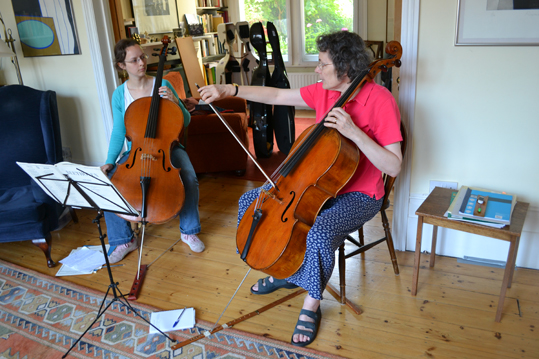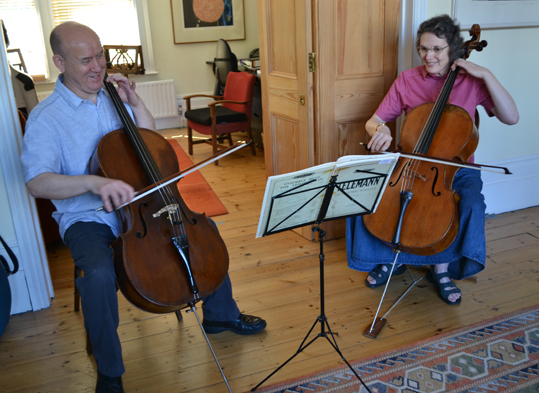
We turn to music for all sorts of reasons and that is the magic of it. Bringing that magic to life involves:

Music first and foremost and plenty of it! After all, this is the reason why we learn to play an instrument! Music for all standards from early cello music to the present day. Interpretation and performance right from the start.
This means 'good use of self', which makes playing enjoyable and effortless and avoids strain and injury. (A skill for the whole of life, of course).
This is simply 'good use of self' again - developing musical imagination - using visualisation as a powerful practice and performance method - making the best use of intuition and thinking processes - learning to 'do everything at once', when your mind really only wants to do one thing at a time (!) - focussing attention without losing sight of the whole picture - developing positive and helpful attitudes.
Really understanding the basic principles and their flexible use in playing music on the cello.
Finding the approach that suits you - spontaneity and routine - practice with and without your cello - making the best use of time available and enjoying yourself as well - that effective learning sequence: 'action' gives 'results' which create 'motivation', all of which leads to the enjoyment and continuing involvement with music and playing that we all seek.
We learn - through cello playing, listening to performances, background investigations - to understand how music is constructed and made, and what inspires its making. This gives us a really heart-felt understanding of music. It enables us to respond and play with real insight - and to create our own music, too, if we want to. We explore musical history, style and composition, and the effect of pulse, rhythm, melody, harmony, structure and many other matters. The main thing to remember is that, while we study to understand and respond to these components, they are indissolubly merged to create music and that's the only reason they are there at all. It's the whole musical experience that counts:
- 'As I leave a concert, I have a clear notion of the quality of the performance which I have just heard. If someone asks me to justify my view, I may start to talk about rhythmic drive, or interpretation, or sense of ensemble, for instance. But I move from the whole performance to the components. I do not move from the components to the whole. In particular, I do not think: the rhythm was right, the phrasing was coherent, and so on - therefore I must have enjoyed this performance. And I certainly do not think something such as SKILLS + INTERPRETATION = PERFORMANCE.'
Mills, J. (2005) Music in the School. Oxford, OUP (and with thanks to Martin Fautley for quoting it in his article in the NAME Journal, Autumn 2010)
Identifying and sorting out the challenges so that you can enjoy rehearsal and performance to the full.
These are my enthusiastic recommendations, at all stages of learning. This includes professional players/teachers wishing to extend their musical experience (and employability) as well as cellists generally, whether professional or not. There is music for players of most standards, so you don't have to wait until you are remarkably proficient! I have a very wide experience in studying and playing contemporary music and have studied the extended techniques involved in great detail (see CV section and Musical Thoughts for more details). I am really keen to share my discoveries with as many musicians as possible so that we can all take part in the performance of music that speaks of our own feelings and reactions to the world around us (see Musical Thoughts for ideas about the interwoven past and present):
This enables us to find that absolutely essential insight, understanding and response that we need to give an inspired and charismatic performance.
You can rest assured that I have well and truly tried and tested the step by step development of the special skills required for microtonal music, all kinds of controlled timbral effects, double bowing, music with electronics on one kind and another, and a whole lot else besides. We study these together so that you can take them on and develop them further for yourself.
Sessions therefore tend to be wide ranging and beneficial for our cello playing and musicianship generally (see Thoughts About Music and also my CV for more detail on this).
to a greater extent than familiar repertoire.
This is often because audiences have no clue as to whether the music's failure to make any impact is due to poor performance or to lack of creative inspiration in the music itself. This places a huge responsibility on performers to play to their utmost ability and I want to share my own experience so that we deliver the most compelling performances that we can.
These also introduce contemporary music and techniques to players and musicians in small groups, either as listeners or with opportunities to try out ideas there and then.
Access to, and appreciation of, musical cultures from around the globe, popular music in all its myriad styles, as well as jazz, rock and 'classical' music from nearer home, is gathering pace exponentially. There is a quite remarkable fusion and cross-inspiration going on in contemporary music in all these styles and genres, providing scope for all sorts of connection and interaction between people through music. It also provides that bridge, that vital initial connection, into the whole world of music through the last several hundred years, especially for younger musicians. (More about this in Thoughts About Music).
Nevertheless, too many musicians who take up instrumental teaching in the UK still receive a surprisingly limited musical education in many respects. In particular Western European 'classical', some call it 'art', music of the last hundred years is still often actively dismissed, so the sheer excitement of this very diverse and relevant musical ferment is missed completely.
As teachers, we have a great responsibility towards our pupils: we influence their thoughts, often at a very impressionable age, and we owe in part our reactions to musical experience of all kinds to the attitudes and ideas that our teachers pass on to us. Let's make sure that we demonstrate and pass on 'openness' borne of understanding and response to the truly marvellous and utterly relevant world of the music of today, including the 'classical' variety!
I can really recommend trying these out (I have some for you to play) to help shape your performance of repertoire of the eighteenth, nineteenth and early twentieth centuries. My own experience (see CV section for details) started when this aspect of playing was just beginning really to flourish, and the new insights into music that such experimentation can bring has been at times downright revelatory.
Improvisation frees us from the written page, allows us simply to listen, and unlocks the creative abilities we all have, even if we are not aware of it. Freely improvised creative expression leads naturally to written composition and might well reveal that you really are the composer you feel you would like to be! Very importantly, your own experience of improvising also reveals so much about how composers think and work and so provides very powerful insights on which to base your interpretation and performance of their music.
Improvisation is also incredibly useful in technical practice and for developing skills in playing by ear, playing from memory and all aspects of musicianship generally.
This is a skill that everyone can develop if they wish to. A surprisingly large number of players - including myself not so many years ago - become very nervous at the mention of inventing their own music. I can reassure them, however, that there are simple and musical ways of getting started and that it will not be very long before the whole process takes on its own fascinating momentum.